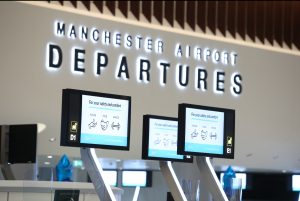Budget carrier flying high after strong third quarter

Budget airline easyJet raised its profit forecast for the current year today after announcing a strong third quarter.
During the three months to June 30, it saw total revenues increase 14% to £1.6bn, passenger numbers grow by 9.3% to 24.2 million, and total revenue per seat, excluding its Berlin Tegel operations, increase by 6.6% to £61.62.
Total revenues included £315m of ancillary revenues, such as hold baggage and allocated seating, which was up 16.3%.
The carrier announced it expects its full year headline pre-tax profit will be between £550m and £590m, up from the previous guidance of £530m to £580m.
Chief executive Johan Lundgren said: “easyJet has delivered a strong performance during our third quarter driven by robust customer demand.
“The airline continues to go from strength to strength attracting more than 24 million customers in the period who chose to fly with us for our leading network of top European destinations, low fares and outstanding service.
“We have also seen the continued growth in ancillary revenues, mainly due to more passengers choosing to buy allocated seating and hold bags.
“With easyJet on track for a positive summer trading period during the fourth quarter, we are raising our guidance for full year headline profit before tax for financial year 2018 to between £550m and £590m.”
However, the airline, which flies 59 routes from Manchester Airport, and 33 from Liverpool John Lennon Airport, said disruption across Europe continues to be an industry-wide issue, and is having an impact on revenue, cost and operational performance.
The main drivers, it says, were European industrial action, mainly in France, and air traffic restrictions.
The airline experienced 2,606 cancelled flights in the third quarter, compared with 314 in the same period last year, of which the majority were due to industrial action, air traffic control restrictions or severe weather.
Cost savings of £85m in the financial year to date have helped improve the financial performance, easyJet said.
However, it said total losses at its operations in the Berlin airport Tegel are expected to rise from the forecast £160m to £175m, as part of a start-up phase at the airport.
Load factors at Tegel, or the number of available seats sold, have risen to above 80%, compared with an overall load factor for the group of 94%, although revenue per seat at the airport is weaker than previously guided due to recent additional capacity in the Berlin market.
Looking ahead, excluding Tegel, easyJet expects the year to September 30, will deliver around 4.5% of capacity growth, revenue per seat to increase by low to mid-single digits in the second half, and a £20m benefit on pre-tax profits due to favourable foreign exchange movements.
Russ Mould, investment director at Manchester investment platform AJ Bell, said: “easyJet’s latest trading update is a perfect reminder of the low-cost airline model.
“It is flying more people thanks to an increase in capacity and it is making more money per passenger thanks to higher prices and non-ticket income, such as baggage fees.
“Clearly these metrics can’t always go up and the industry has certainly shot itself in the foot by over-expanding capacity over the past few years, making the airline sector highly competitive. And easyJet isn’t immune to pressures from higher oil prices and recurring industrial action.
“However, this is a business that is clearly doing its best to cope with industry turbulence and continues to churn out large profits.
“Its decision to develop a package holidays business also shows how the management team aren’t short of ideas to find new ways to capitalise on a very strong brand and squeeze more money out of its large customer base.”
Meanwhile, Manchester Airport is set to register a rise in holiday traffic, according to figures released by the Civil Aviation Authority today.
It says with the holiday season about to kick in, this year’s busiest single day for flights departing UK airports will be July 27, with 8,841 flights.
It said, for Manchester Airport, based on the latest information, the CAA expects five per cent more passengers to depart this summer.
Last year, Manchester processed three million passengers during the summer period.








